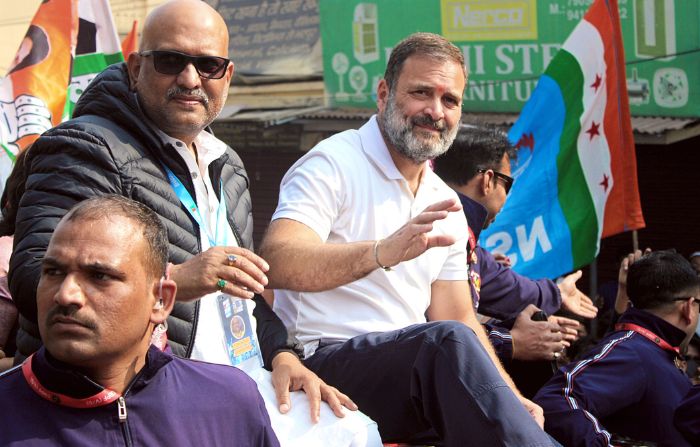- Sunday, April 20, 2025
The Indian National Congress leader has been holding a cross-country march to mobilise public opinion in favour of his beleaguered party which has been beaten by Modi’s BJP in two consecutive general elections.

By: Shubham Ghosh
HE is yet to achieve a major electoral victory over prime minister Narendra Modi and often finds himself to be a subject of ridicule, not only from India’s ruling Bharatiya Janata Party (BJP) but sometimes even from other parties that are opposed to Modi and his party.
Yet, Rahul Gandhi continues to be the major face of the Indian National Congress and is currently in the middle of a cross-country Bharat Jodo Nyay Yatra (Unite India Justice March) from the eastern to the western end to mobilise public opinion in favour of his party which has been badly beaten by Modi in several elections over the past decade.
Recently, the 53-year-old leader asked people in a rally in the northern state of Uttar Pradesh, a key one in India’s electoral battles, especially those belonging to the Dalit and low castes, why they were asleep even as they were ‘being fooled’.
“Are there any of you Dalits or other low castes in the judiciary?” Gandhi asked the crowd.
Read: Decoding Modi opposition’s pre-poll deal in UP, India’s key electoral state
“Are any of you in the media? Do any of you own even one of India’s 200 top companies? Of the civil servant class which rules this country, are any of you among them?
“Why are you all asleep? Don’t you see you’re being fooled? There are hardly any of you in these institutions. You are 73% of the population. What kind of society is this where you don’t make any decisions?” the leader, who was once a parliamentarian from Uttar Pradesh but lost in the 2019 general election to Smriti Irani, the current child and women welfare minister of India, from Amethi, which was once a bastion for the Gandhi family.
Read: Opinion polls predict Modi’s BJP poised for third term victory
Rahul Gandhi is the fifth-generation leader of India’s illustrious first family that used to dominate the country’s politics once but has lost some of its aura in recent times. After tasting humiliating defeat in the 2014 and 2019 national elections, Gandhi has tried to project himself as a man of the masses to defeat Modi and his Hindu nationalist BJP.
He has sought a “caste census” that would focus on the wealthy and the powerful.
Gandhi, who completed a south-north pan-India march in 2022-23, has been holding rallies every day in an attempt to ‘awaken’ people ahead of the general elections.
Last week, he went to Prayagraj or formerly Allahabad, a city which is closely linked with India’s Nehru-Gandhi dynasty that has given the country three prime ministers and almost a fourth in 2004.
According to Gandhi, India is still in a dark phase marked by the caste system and tries to inspire people by telling them that their share in the country’s wealth is not much.
“You’re nowhere,” the Congress leader tells the crowds. “You have to find out what is your share in the country’s wealth. How much wealth do the 73% castes have in this country? This will reveal everything.”
India’s affirmative action over the past few decades has been based more on estimates. The last time a caste census was held was in 1931, when India was still under colonial rule. The findings of a census in 2011, on the other hand, were never published.
In 2023, the government of the eastern Indian state of Bihar, ruled by a party which has now joined Modi’s BJP soon after leaving its alliance, became the first in the country to carry out a caste census. It showed that more than two-thirds of its 130 million people came from the so-called “backward” of marginalised communities. Gandhi is in favour of a similar exercise in India’s other 28 states
Through the idea of caste census, the opposition not only seek to broaden its popular base and take on the dominant BJP, but also neutralise Modi’s effort towards blurring caste lines and consolidate the Hindu identity, which observers say is part of the BJP’s Hindutva agenda that has polarised the country along religious and ethnic lines.
But experts feel it is far too late for Gandhi to try to form a favourable public opinion on this issue. Asim Ali, a political researcher, told The Guardian that the Congress’s attempt to try soft Hindutva did not work out and the focus on caste has come far too late.
“It will need five to 10 years to mobilise opinion on this. It’s too late to have an impact on this general election,” he told the news outlet.